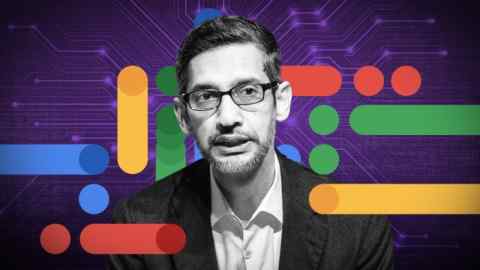Google this month sought to re-establish itself as a pioneer in technology research and artificial intelligence, quelling criticism that it has lagged behind rivals and sending its stock to record highs.
Throughout December, the big tech group impressed investors with a more advanced version of its AI model and application called Gemini 2.0, which beat rivals in benchmark tests.
The company announced a new generation of custom AI accelerator chips, or Tensor Processing Units (TPUs) called Trillium, in a series of tweaked releases. This is aimed at countering Nvidia’s near-monopoly in the market.
Google also added the ability to create complex investigative reports on your behalf (Project Mariner) and answer real-time queries across text, video, and audio via smart glasses (Project Astra). And we launched video and image generation models called Veo 2 and Imagen 3.
Ethan Mollick, a Wharton Business School professor and author of a book on the technology, said of Google’s release, and Veo in particular: 2. “Amazing thing.”
“This is not a steady progress. We are seeing AI make uneven leaps beyond the ability to easily determine its impact,” Mollick added.
Additionally, Google acknowledged last week that it had made a breakthrough in quantum computing with a chip called Willow. The ability to keep “qubits” stable for long periods of time reduces errors and allows useful calculations to be performed.
The company claims it can complete tasks in five minutes that would take a traditional supercomputer 1 billion years, but this elusive technology is still years away from commercial application.
In further recognition of its superiority in research, in October Sir Demis Hassabis, founder of Google’s AI research lab DeepMind, and his colleague John Jumper used the AI software known as AlphaFold. He shared the Nobel Prize in Chemistry for predicting the structures of all known proteins.
A showcase of technological advances and three consecutive quarters of double-digit profit growth helped parent company Alphabet’s stock rebound.
The company’s stock has risen 38% since the beginning of the year, hitting an all-time high of $199.91 this week, giving it a market capitalization of $2.3 trillion. Still, the $1 trillion gap with Microsoft remains to be closed.
Since releasing ChatGPT in late 2022, Google has made progress on the underlying research and has seen its early advantages in AI go to waste, especially when arch-rival Microsoft partnered with OpenAI. I saw it. Google took a year to release an equivalent version, Gemini.
“Alphabet has been under constant scrutiny since ChatGPT was released,” said Tiffany Xia, U.S. equity portfolio manager at AllianceBernstein, a shareholder in the company. “Gemini 2.0 and quantum chips give investors new confidence that their company is one of the leading powerhouses in the technology industry.”
In a sign of growing confidence, Chief Executive Sundar Pichai, who faced the harshest criticism of his nine-year tenure over delays in introducing AI in the spring, said Microsoft’s chief executive Satya Nadella I objected to the Chief Executive Officer (CEO).
“We’d love to do a side-by-side comparison of Microsoft’s own model and our model any day, any day,” Pichai said at the DealBook Summit earlier this month. She added with a smile, “I’m using someone else’s model.”
The company is demonstrating advances in technology, but it must figure out how to incorporate these innovations into consumer and commercial applications without stifling the creativity of its engineers.
Pichai has made steady progress in integrating AI into its search engine, but it also needed to placate investors worried that such a move would eat into advertising revenue.
Search giants still control 90 percent of the market, but for the first time in decades they’re seeing real competition with AI-powered products from groups like OpenAI, Anthropic, and Perplexity that can provide comprehensive answers rather than links. facing competition.
Google’s previous solution was an “AI Overview” that displayed short answers to questions at the top of search results pages. Executives say the feature is popular, but early evidence suggests users are clicking on summary ads less frequently, and research from advertising platform Skai shows that in the third quarter It is said that there was a decrease of 8% compared to the same period last year.
Recommended
Other threats also remain. After losing a major antitrust lawsuit against the company’s search division in August, the Justice Department forced the sale of the Chrome browser, terminated the exclusive deal that made it Apple’s default search engine, and removed the massive amount that powers Google’s own web pages. I’m trying to share user data. Ranking algorithms, ad targeting systems, AI model training.
The company is awaiting the results of another exclusive trial in the U.S. focused on its ad tech business, if Alphabet’s other core revenue sources could be split.
Another potentially dangerous person is Elon Musk. The world’s richest man will gain influence over President-elect Donald Trump, influence AI regulation and antitrust enforcement after spending $250 million to win last month’s US election I gained power.
Musk’s xAI startup also built the world’s largest supercomputer in Memphis, Tennessee, in record time. The company, nicknamed Colossus, has networked 100,000 cutting-edge Nvidia graphics processing units and plans to expand its data center tenfold to 1 million chips. This should help xAI’s chatbot Grok catch up with the competition in 2025.
“Thunder seems more confident now. Google’s ethos is perfectionist, so products may be released at a more meticulous and calculated pace, but they’re not so sure about it.” Don’t rush,” says AllianceBernstein’s Shea. “This is a competition, and recent developments show they are still in the competition.”

